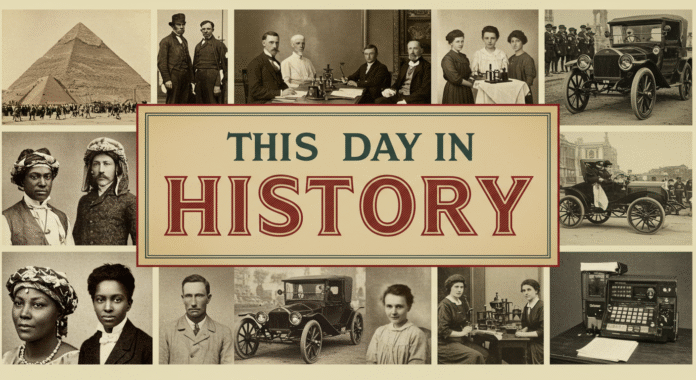1. 1613 – Globe Theatre Burns Down During Performance
On June 29, 1613, London’s iconic Globe Theatre, home to many of William Shakespeare’s plays, was destroyed by fire during a performance of Henry VIII. A cannon fired as part of the show accidentally ignited the thatched roof, setting the entire theater ablaze. Remarkably, there were no fatalities, though the building was reduced to ashes in less than two hours. The Globe was rebuilt the following year and continued to serve as a cultural landmark. This event is historically significant because it underscores the importance of theater in Elizabethan society and the fragile nature of early performance spaces. It also shows how public entertainment was entwined with risk. Interestingly, an eyewitness account describes how one man’s burning breeches were doused with a bottle of ale, saving him from serious injury.
2. 1956 – Interstate Highway Act Signed by Eisenhower
On June 29, 1956, President Dwight D. Eisenhower signed the Federal-Aid Highway Act, authorizing the construction of 41,000 miles of interstate highways across the United States. This monumental infrastructure project transformed American life by revolutionizing travel, boosting the economy, and accelerating suburban development. The act is historically significant because it not only reshaped transportation but also influenced migration patterns, commerce, and even the U.S. military’s mobility during the Cold War. A lesser-known detail: Eisenhower’s support for the interstate system was inspired by a grueling 1919 Army convoy trip across the U.S. that took more than two months to complete.
3. 1974 – Isabel Perón Becomes First Female President of Argentina
On June 29, 1974, Isabel Perón became acting President of Argentina after her husband, President Juan Perón, became seriously ill. When he died just days later, she formally assumed the presidency, becoming the first female president in the Western Hemisphere. Her rise to power was groundbreaking for women in politics, though her presidency would later be marred by economic turmoil and political violence. This event is significant for its pioneering role in female leadership on a global stage, reminding us of the complex challenges faced by women breaking political barriers. Intriguingly, Isabel had been a tango dancer before marrying Juan Perón.
4. 2007 – Apple Releases the First iPhone
On June 29, 2007, Apple released its first iPhone, an innovation that forever changed technology and human communication. Combining a phone, iPod, and internet browser in one sleek device, the iPhone was hailed as revolutionary. Its intuitive interface and App Store ecosystem soon reshaped everything from business to social interaction. Historically, this release marks the dawn of the smartphone era, which continues to transform global culture and economies today. One fascinating detail: Steve Jobs initially considered partnering with Motorola instead of developing Apple’s own device but abandoned that plan after frustrations with their ROKR phone.
5. 1995 – Space Shuttle Atlantis Docks with Mir Space Station
On June 29, 1995, Space Shuttle Atlantis successfully docked with Russia’s Mir space station, marking the first such linkup between American and Russian spacecraft since the Apollo-Soyuz mission two decades earlier. This event symbolized a new era of cooperation after the Cold War, paving the way for future international partnerships on the International Space Station. It was historically significant as a powerful gesture of peace and scientific collaboration. An interesting footnote: Atlantis brought up supplies and a new Russian crew member, who replaced one who had spent 75 days in orbit.



